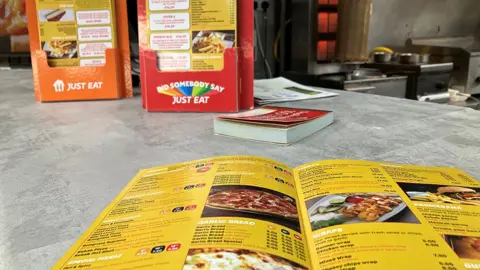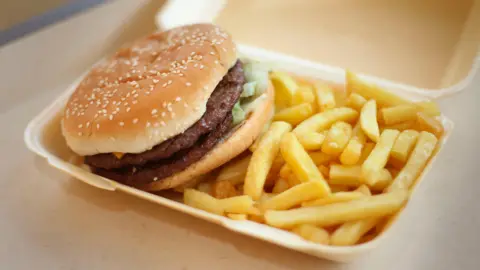Council asks for help to tackle childhood obesity
 BBC
BBCCouncils need more support from central government to help bring down childhood obesity rates, a local authority has said.
Ten years ago Gateshead Council used all the planning powers available at a local level to introduce a blanket ban on any new hot food takeaways in the area, in what Labour leader Martin Gannon said was a "controversial" but necessary move.
But, while the policy had some success in areas with the highest density of fast food outlets and deprivation rates, the overall childhood obesity rate in the borough has not fallen.
The government said it was giving local authorities stronger powers to block applications for unhealthy takeaways near schools.
"We were the first," Gannon said.
"It's not an easy decision, it is controversial, but we should be trying to support people to make healthier choices."

In 2015, 23% of 10- and 11-year-olds in Gateshead were obese - higher than the national average of 19%.
The council decided to take radical action, using its planning powers to effectively stop any new hot food takeaways from opening - something no other local authority had attempted.
The aim was to more than half the childhood obesity rate to 10% over 10 years.
But the most recent figures suggest it has dropped by just 0.5%.
One study last October did show the policy had helped reduce the rate by up to 4.8% in areas which previously had the highest density of takeaways and the highest levels of deprivation.
But, overall, there was no significant reduction across the borough.

Restrictions on socialising and eating out during the Covid pandemic did not help.
The government allowed businesses to sell takeaway food as long as they registered with their local authority.
This led to a boom in delivery apps and so-called dark kitchens - food businesses that only offer home delivery and have no dine-in areas.
The first piece of research into the impact of dark kitchens on the food environment in the North East was stark.
Researchers at Teesside and Lancaster universities discovered Gateshead had at least 116 dark kitchens in 2024 - an average of 59 per 100,000 people and a far higher density than Newcastle (15 per 100,000 people) and Middlesbrough (nine per 100,000 people).
'No silver bullet'
Professor of health inequalities at Lancaster University, Heather Brown, pointed out a potential loophole as, despite Newcastle and Gateshead having strict planning policy, dark kitchens do not fall within the current guidance restricting food outlets.
Prof Amelia Lake, expert in public health nutrition at Teesside University, said: "The food environment is constantly changing and local government policy is ill equipped to keep pace."
The council's director of public health Alice Wiseman said the policy was never going to be a "silver bullet".
"Going back to the story of tobacco, every time there was a restriction put in that was protecting the public, the industry found a way round it and that's all we're seeing now," she said.
Possible solutions like action to reduce advertising for ultra-processed food would be easier if implemented nationally, she added.
"But it's important that we don't think there is nothing that we can do."

There are further controls on junk food advertising in the pipeline.
Labour North East Mayor Kim McGuinness is one of nine UK mayors backing Jamie Oliver's 'AdEnough' campaign.
They have made a commitment to ban junk food marketing across the areas they control, including public transport.
Ms McGuinness said the move was sending a "clear message to junk food companies".
"The days of targeting children and young people with predatory advertising for products that harm their health are over," she said.
"Enough is enough."
 North East Combined Authority (NECA)
North East Combined Authority (NECA)The chief executive of trade body UKHospitality, Kate Nicholls, said takeaways "ensure there are a range of healthy options for customers to choose from".
"Creating policy that targets one sector of the economy is misguided and fails to recognise the wider economic benefits sectors like hospitality offer to communities, through local jobs for local people," she said.
The government said obesity "sets children up for a lifetime of health problems and costs the NHS billions".
The Department for Health and Social Care said: "This government has given local authorities stronger powers to block applications for unhealthy takeaways near schools and stop fast food giants targeting pupils.
"As part of a major shift in the focus of healthcare from sickness to prevention, we're also ending the advertising of junk foods across both TV and online."
Follow BBC North East on X, Facebook, Nextdoor and Instagram. Send your story ideas to [email protected].
